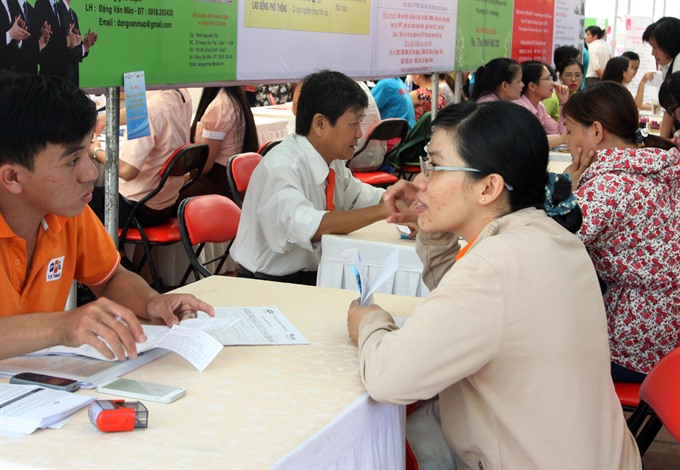 Society
Society

“I have never seen a trained housemaid,” said Nguyễn Thanh Vân of Hoàn Kiếm District, who is seeking a nanny for her baby nephew. “I have asked almost everyone in my circle of acquaintances. They shared tips for choosing the ideal maid who can both care for the baby and help my sister-in-law with housework.”
 |
| Women seek jobs, including domestic work, at a job fair in HCM City’s District 10. Promoting domestic work can help reduce unemployment and create job opportunities, especially for women from rural areas, officials say. VNA/VNS Photo Phương Vy |
by Khoa Thư & Minh Ngọc
HÀ NỘI — “I have never seen a trained housemaid,” said Nguyễn Thanh Vân of Hoàn Kiếm District, who is seeking a nanny for her baby nephew. “I have asked almost everyone in my circle of acquaintances. They shared tips for choosing the ideal maid who can both care for the baby and help my sister-in-law with housework.”
Domestic work is stipulated as a professional job in the 2012 revised Labour Code. However, it is still facing serious challenges, including lack of vocational training and insurance for workers.
There is no official data on the number of domestic workers in Việt Nam, but given the expanding middle class, the demand for domestic workers is clearly rising, especially in metropolitan areas.
A study conducted in 2011 by the Ministry of Labour, Invalids and Social Affairs (MoLISA) and the International Labour Organisation (ILO) showed that 46 per cent of surveyed households in Hà Nội and HCM City hired domestic workers and this rate was more than twice the pre-2000 period.
Incomplete MoLISA data indicates that the number of domestic workers has risen from about 157,000 in 2008 to about 246,000 in 2016. In 2020, 350,000 people are forecast to be employed in this kind of work.
Vân is one of many Hanoians seeking domestic workers. Đỗ Vân Hương of Long Biên District says she needs housemaids for particular family events, such as the birth of a new baby or a relative’s illness. Bùi Việt Nga of Ba Đình District says she simply wants to spend her time doing things other than housework.
Code of skills
To satisfy employers’ diverse requirements, domestic workers must have sufficient skills to perform a variety of household services. According to a document detailing the qualifications of domestic workers, co-authored by the Research Centre for Gender, Family and Community Development (GFCD) and the National Institute for Vocational Education and Training (NIVT), responsibilities include cooking, cleaning, laundry, caring for children and old people, etc. Moreover, domestic workers are asked to practice communication skills.
However, most housemaids cannot fulfil basic requirements of their job.
Ngô Thị Ngọc Anh, Director of GFCD, said that from 97 to 99 per cent of domestic workers are women, more than 90 per cent of them have never been trained. Most employers live in cities while employees usually come from the countryside. The differences in background sometimes result in disagreements on labour relations.
According to a 2015 Government decree, employers and domestic workers have to sign contracts stipulating that house helpers are entitled to at least 24 continuous hours off a week, 12 annual paid leave days and all public holidays. Employers also have to cover compulsory social and medical insurance for domestics and are not allowed to pay them less than the regional minimum wage.
However, both employers and domestic workers often neglect the contractual obligations.
For the past decade, Hương has found domestic helpers via acquaintances. But even the most diligent one stayed with her family only 15 months. “I didn’t want to change housemaids. However, they usually quit, making unbearable requests and threatening to quit over pay demands,” Hương said.
She also has experience with professional housemaid agencies, but says they usually offer part time services with fixed contracts. Workers supplied by those agencies complete training courses and work mostly as cleaners.
The lack of a labour contract prevents domestic workers from enjoying social welfare, according to Mai Đức Thiện, head of the Legal Department under MoLISA. “In case of a labour dispute, it is difficult for authorities to investigate,” Thiện added.
Vocational training needed
To ensure the rights and benefits of domestic workers, several agencies have conducted training courses for them.
GFCD collaborated with the Hà Nội Women’s Union and Hà Nội Department of Labour, Invalids and Social Affairs (DoLISA) to launch a project called “Promoting the right of domestic workers to access social welfare and employment policies in Việt Nam between 2017 and 2021.”
The project is being implemented in different districts of Hà Nội such as Cầu Giấy, Thanh Xuân, Hai Bà Trưng, aiming to provide 1,500 domestic workers with some legal knowledge.
Additionally, the Hà Nội Employment Service Centre is conducting a market survey on domestic work to build suitable training courses and offer variable services. For now, the number of trained domestic workers cannot satisfy the current demand.
Nguyễn Tường Anh, Marketing director of the 88 domestic worker service company in Cầu Giấy District says she gets about 1,000 requests for workers a month but can only cope with 30 to 40 per cent.
The domestic work market is shifting from full-time worker to part-time worker requirements. Lê Văn Tiệp from the Hà Nội Centre for Women’s Development and Support says domestic workers need to be trained at vocational training schools. Domestic workers have stable incomes and contribute to society. Promoting domestic work can also help reduce unemployment and create job opportunities, especially for women from rural areas, she says. — VNS